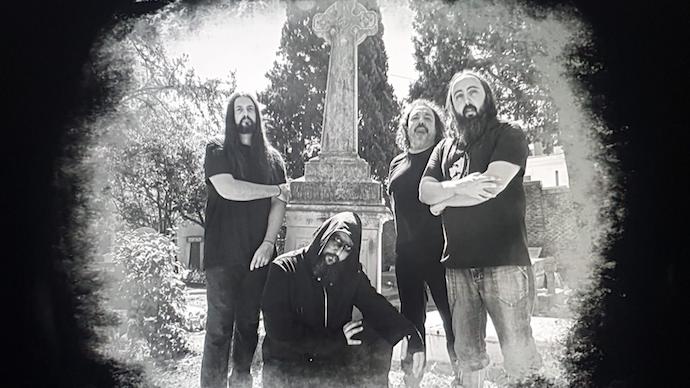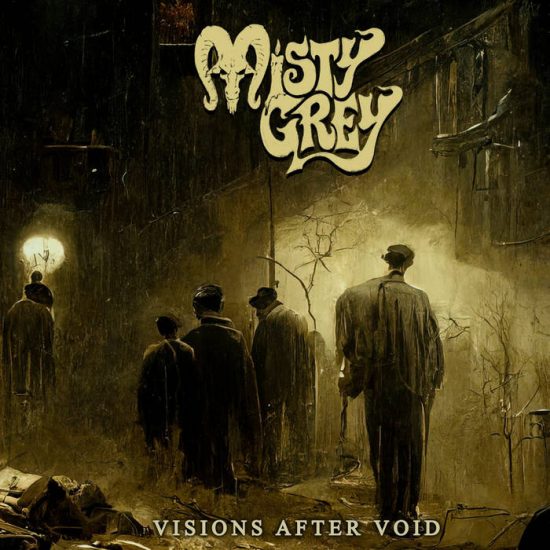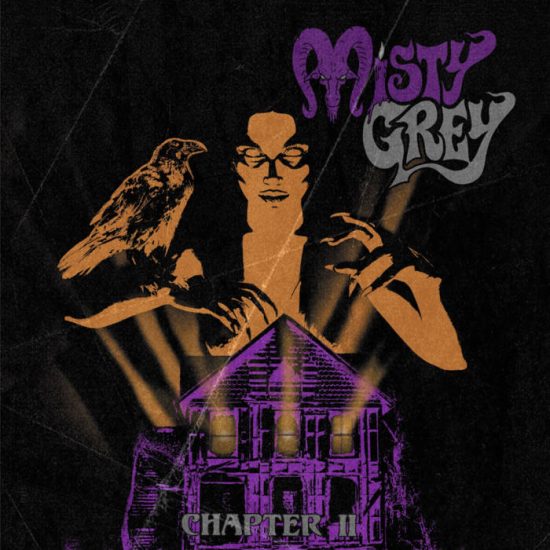
(Everyone knows that Doom Metal is Comrade Aleks‘ main love, and although his interviews have branched out into other dark genres, today he returns to the old flame with a very interesting discussion with members of the Spanish band Misty Grey, whose newest album was released in June of this year.)
Misty Grey first met in Madrid in 2011. This is one of the very few Spanish doom metal bands, and doom-heads know Misty Grey due to their honesty, passion, and good taste.
Another thing is that the backbone of the group in the vertebrae of Juan (guitar), Robin (bass) and Javier (drums) seems to have fallen victim to the gypsy curse or something like that: They were not lucky with either of the ladies who recorded vocals for the first and the sophomore albums, and the necessity to find a new singer was a scourge for the band.
Their new album Visions After Void was recorded with the new front-man Angel Flores, who sang for almost a decade in a local Viking folk band. And you know what? Angel is incredibly good in doom metal too. His range is much wider than that of the former vocalists, and he easily copes with both hard rock and epic parts previously uncharacteristic of Misty Grey.
These seven tracks recreate the recognizable atmosphere of traditional doom, they reflect the composer’s talent and passion, and this material has a sense of belonging to the modern doom scene too. Although what kind of modernity is something special, as the album is dedicated to the work of the German film director Fritz Lang, who authored the large-scale expressionist dystopia Metropolis (1927) and one of the first “noir” detectives M (1931).
To be honest, I can name a couple more doom albums that are entirely dedicated to dark cinematography masterpieces, so it’s not entirely true to praise Misty Grey for originality, but you know… They are original in their own way, and Visions After Void surpasses many of the modern doom albums. Juan (guitars). Javi (drums) and Angel (vocals) introduce the band to NCS’ readers in this in-depth interview.

Hi Juan, Angel & Javi! How are you? What’s going on in Misty Grey’s camp now when you finally have your third album released?
Juan: Hi Aleksey! Fine here, thanks so much for your interview and big support as always. We’re having a busy time now upon releasing our new album and we’re really flattered about the overall warm reviews.
Grey Mist was recorded with Malicia, Chapter II – with Bea, and now you have Ángel in the band. How did you get it touch with him? Didn’t you hold to the concept of the band with a front-woman?
Juan: We tried two or three (female) singers before but nothing came out of it. Then we put an ad in a well-known musicians site, and Angel got in touch with us. He showed up to our rehearsal room one evening and could do five tracks all of a sudden. And that was it. We never thought about a female or male singer since the very first days. It’s destiny, who knows. But many people still think that a male singer fits better in a Doom metal outfit.
I was surprised by Ángel’s epic vocals when I was listening to Visions After Void, but then I found that he sang in the Viking metal band Pimeä Metsä and everything became clear. Does his appearance influence your approach to song-writing?
Angel: While I was singing in Pimeä Metsä, I had a very tough vocal training during every rehearsal. Combining growls, fry and raspy voices was a demanding routine that made me suffer some throat injuries several times.
After Pimeä’s dissolution, I made some auditions for other similar bands, but when I auditioned on Misty, I found that the vocal and lyric style allowed me to explore melodic and rich-in-hues vocal lines. Besides, the “sabbathical” vibes of some doom metal singers fascinated me from the first listening. In doom metal I found my dark haven of peace.
So I tried my best to fit in Misty Grey, going above all prejudice and offering all the best that I was capable of. The results can be heard on our new album.
Angel, what was your first encounter with doom metal? Did you want to sing in a doom band before you found Misty Grey’s request?
Angel: Sorry to sound stereotypical but, like many metalheads, Black Sabbath were the ones who blew my mind from their first self-titled album, whose vinyl fell into my hands when I was 14 years old. Years passed and some other bands (like Candlemass, Type O Negative, Paradise Lost, Amorphis, etc.) got into my life with a huge variety of obscure melodies, inexorable rhythms and lyrics that dragged me to the deepest infernal circle.
I never thought of auditioning in a doom band specifically but I never say no to a project that would attract me and arouses my curiosity, proposing a challenge that will make me grow as an artist. And that is what I found in Misty Grey. From the very first time I found three comrades who supported me, offered me absolute creative freedom, and discovered me some awesome classic doom bands I didn’t know (like Pentagram, Saint Vitus, Trouble, Witchfinder General, etc.). It was a win/win.

Your second album Chapter II was released five years ago. What did you do all this time?
Javi: We spend many many times with new songs. Usually the new songs were small challenges for us and we wanted to add some new features, like more heavy sound, keyboards, more arrangements…Also we had the adaptation of a new singer, in this case with a radical change in terms of voice, and pandemic horrors were more reasons for delaying.
Juan: Well, we found Angel as a new singer in October 2019, we did a gig with him a month after, and then the Covid-19 come over to us. So he needed time and had to learn some old songs as well as the newest ones. We spent most of the time arranging the new tracks and writing lyrics, so it wasn’t boring at all.
It’s said that Visions After Void was recorded in June 2022; how long did you actually work over this material?
Juan: We already had six brand new tracks and we couldn’t rehearse because of Covid. We should have recorded our new album in 2021. But at the eleventh hour we decided not to hurry and rehearse very carefully all the new stuff. We always want every song to sound perfect, no matter how long it takes.
And the result is truly killer! It’s good that you managed to complete the album. Do you have some leftovers after this recording session?
Angel: Thank you very much indeed. The recording sessions were hard but I felt very confident and comfortable. Dozens of hours of rehearsal paid off, recording sessions passed quickly and productively, and the expertise of Javi Félez (sound technician and producer) behind the controls resulted in what today is an incredible album and we are very proud of our “spawn”.
The album is dedicated to the Austrian film director Fritz Lang, who left his impressive mark on the world dark cinematography. What was your first encounter with his movies?
Angel: Fritz Lang is also one of my favorite directors in terror and noir films. I first “met” this filmmaker in a movie festival in the late ’90s, where Metropolis and M were exhibited. They blew my mind (specially Metropolis) so I included this director in my personal list of “Greatest Movie Makers”.
Juan: Yes, actually five out of seven tracks are dedicated to Fritz Lang movies. He was the master of light and shade. I discovered some of his movies when I was a child, he was not as popular as Alfred Hitchcock but he had a fine style. In fact all European directors had this unique style: Otto Preminger, Max Ophuls, Billy Wilder, Robert Siodmak, HC Clouzot, Jean Renoir, Jacques Tourneur… Film noir was hype in USA then, so all of them ended.
Angel, may you name other film directors from your list of Greatest Movie Makers?
Angel: It’s really, really hard to choose a few directors from my list (laughing) but I will name some real classics like Georges Méliès, Serguéi Eisenstein, Friedrich Murnau (every movie included in German Expressionism is amazing), Ingman Bergman, Cecil DeMile, Orson Welles, Alfred Hitchcock, Chaplin, Buster Keaton, John Ford, Sergio Leone, Akira Kurosawa, etc.
Other mythical directors are Francis Ford Coppola, Martin Scorserse, Steven Spielberg, Roman Polansky, Lars Von Trier, David Lynch, Joe Dante, David Cronenberg, Oliver Stone, Milos Forman, Clint Eastwood, James Cameron, Joel Schumacher, Quentin Tarantino, Ridley Scott, … uufff, I cannot stop and we don’t have all day. To finish the list, I highly recommend three more nowadays directors: Ari Aster, Robert Eggers and Jordan Peele. Someone stop me!!! (laughing)
As far as I understand, “I Confess” is based on Alfred Hitchcock’s movie with the same name. Why did you choose it and “Lullaby for a Dead Corpse” on this album dedicated to Fritz?
Angel: I personally chose “Lullaby…”, despite not being properly Fritz Lang’s, because of its fascinating story of terrifying gas light. This film also has a curious anecdotary behind the cameras, involving its main actresses Bette Davis & Olivia de Havilland. Catchy ingredients to make a doomy anthem.
How did you decide which of his movies to choose as the songs’ plots?
Angel: Muses decide over our thoughts and desires (laughing). Now seriously, song melodies composed by Juan or Robin come first and they inspired us; some of them remind a sort of proud sense of surviving in war times (“Hangmen Also Die”) or the anxiety of being pursued by law, criminals, or some kind of entity (“M” or “Ministry of Fear”).
And how did you write the lyrics? Did you want to retell the movies’ plots or to show the events through the eyes of the films’ protagonists?
Angel: I wrote the lyrics as if I was a whisper behind the protagonist or a thought crossing thru his/her mind. An inner voice that relates what the main character is watching or feeling and tries to guide him/her to save him/her or condemn him/her. As a curiosity, the lyrics of “Hangmen Also Die” occult a secret. Can you discover it?
I’ll pay special attention to the song next time. Do I get it right that the album was released DIY? Did this approach approve itself with Chapter II?
Juan: Not really. All our albums were released by Vertebrae Records, along with Topillo Records which unfortunately is no more in the business. Vertebrae is almost full dedicated to Black Metal but they release some Doom bands now and then. My own little label is Out of the Past Productions, we did Grey Mist and Visions After Void. And Imbunche Records is also sharing duties, a new label specialized in Doom metal. All of them are small labels but they are our friends and we feel so comfortable working with them.
We know how difficult it is nowadays to break through, even when the band has killer stuff in their discography. Do you have a plan about how to reach more listeners with Visions After Void?
Juan: We’d like to have more listeners, of course. We are always trying to get some exposure through the media but you know you need some money that we don’t have for promotion. So it’s always the same, a bit of Facebook, a bit of Instagram, a bit of radio and YouTube broadcasts… We’d like to tour a bit but as I told you before, you need money and time.
Robin and Javi also play in the band Simón del Desierto, which is dedicated to Luis Buñuel’s films partly. It’s interesting to witness such productive cinematographic doom coalitions. Do you plan to play a common gig for both bands?
Javi: Simon del Desierto, it’s my other band and Robin only helped us in some gigs. We are a special band, me and Julio (Dispain, Nagant, Estrume) are the only members, and the others change based upon the band concept. We had a female singer, we were an instrumental duo, we had a male singer, we were a trio with Robin, and now we experimenting another trio featuring two guitars. We play doom based in Maryland sound (Unorthodox, Revelation, The Obsessed..) but with a different approach.
In the past we played along with Misty Grey and we planning a future gig altogether.
Julio also is the head master of Imbunche records that helped a lot in the Visions After Void release.
How soon may we expect the Simon del Desierto? Do you plan to base it on the same conception?
Juan: Simon del Desierto are working on new tracks, but they are looking in the long run, you know; they have a second guitar player and they have to make it sound right because it’s not so easy. As far as I’m concerned, they don’t have a real singer right now as they had before, so we’ll see what happens.
How often do you play live nowadays? How do you usually organize the band’s shows now?
Juan: We don’t play live so often. You know, Doom metal was never a trendy style, so it’s difficult to pull some people to the shows, even more nowadays when there are thousands of bands of different styles and a big lack of live venues. Nevertheless our main commitment is to record as much as possible. Playing live is a secondary motion.
Yes, I know how it’s hard to find doom metal band in Spain! So I wish you to find more listeners and become rich and famous : D Okay, I’m just kidding. However, thanks for the interview gentlemen!
Juan: Thanks to you as always, dear Aleksey. And thank you so much for your invaluable support to Doom Metal and subgenres.
http://www.facebook.com/mistygreydoom
https://mistygreydoom.bandcamp.com/album/visions-after-void
